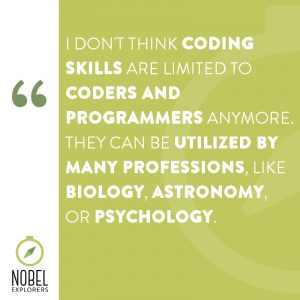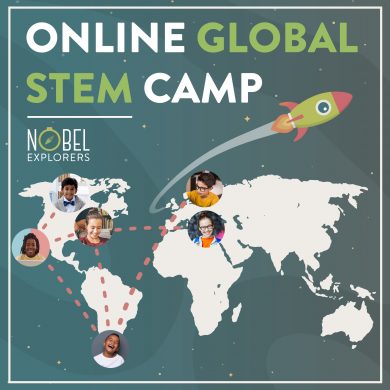6 Fields Where Coding Comes in Handy
Today’s society keeps on raving about the importance of coding. “It’s the future!”, they insist, but you rarely hear why it’s the future or what kind of job it’s preparing you for. Sure, you’re sitting at a computer and writing code – but what for?
That’s where we come in! We’d like to help everyone interested in coding learn about all the different areas in which coding can come in handy. If you’ve ever asked yourself, “How is coding even useful to me or anyone else and what can I do with it besides sit and type?”, this article is for you!
1. It’s All About the Design
Have you ever visited a website that was just a plain background with text on it? You weren’t really in awe of it and didn’t want to go back there unless you had to, right? To stop that from happening to your website – or some other you may simply be working on – you can use the magic (and science) of web design.
Any website, whether it be a cooking blog or Facebook itself, needs good design in order to be attractive – and highly functional – for its visitors. This is where coding meets art – you can combine and create endless versions of a single website until you’ve found the one that works and looks best.
If this is something your child might be interested in learning, enroll them in our online mini-project, “Coding & Web Design”. In only a week, they will learn how to build the entire website from scratch. They’ll be working in an international team from the comfort of their home, while creating a website that will go live at the end of the project!
2. Make Our Lives Easier with Robotics
You might have guessed this one already. The field of robotics would be impossible without the art of coding. Yes, I said art. Because, even though coding is a very exact science, if you find a fulfilling project in a field that interests you, you’re bound to become an artist. You need to always be coming up with creative ideas in order to make something that has not been done before – work. Today, we may think that inventing a phone is pure science, but Alexander Graham Bell probably thought of it in different terms.
Trial and error, and the joy of seeing your robot friend move and respond exactly the way you wanted it to once you get the code right – can you imagine anything better? Just take a look at what has already been accomplished in this field thanks to coding and the brilliant minds behind it:
3. Teach Artificial Intelligence to Think
Have you ever chatted with Cleverbot? Or Siri? Or Cortana? Those are all AI’s – artificial intelligence programs. They are able to learn based on your answers, much like a child would when they are just starting to talk and ask questions.
However, they are still very basic in what they do – but AGI’s (Artificial General intelligences) are not. They are capable of what is referred to as deep learning and they are able to pass the coffee test. This is not a joke, I promise – it’s an interesting, yet very telling way of making sure your AGI is functioning at a human level.
4. Send People into Space
Yes, astronomy. NASA would have gone bankrupt decades ago if it didn’t have some of the brightest programmers in history working on its projects. Margaret Hamilton is one of them. She is a brilliant programmer, who created the software that put the first man on the Moon. [1] When Apollo 11 was reporting problems, her code was what made it possible for the Moon landing to happen. The software for this mission had thousands of lines of code – but don’t let that scare you! Margaret also had 400 people helping her with the software design, so she was never alone in it. [1]
Imagine being able to say one day that your code was the one that helped invent traveling through hyperspace! Why not? Once upon a time people thought that going to the Moon was impossible, too.
5. Help Psychologists with Their Numbers
This one might sound the weirdest of all. Aren’t psychologists supposed to be talking to people? They are, and they do! But to learn how best to help people, they need to have data that tells them what people are usually troubled by. The way they can do that is through giving them tests. However, they don’t just count the answers in their heads in order to acquire data – they mostly use a program called SPSS. SPSS (Statistical Package for the Social Sciences) is like a very cool Excel for psychologists; it contains all the necessary formulae for the types of measurements they need.
Not only did someone need to code that entire program, but from time to time, you need to be entering your own code into it to make it do exactly what you want it to. Who knew even social sciences relied on coding?
6. Learn All About the Human Code
Let’s finish this list with another surprising field. Biology is the science that studies living beings – which, as far as we know, do not have any code inside of them… Or do they? We are all, essentially, all made up of code. For example, our DNA consists of four nucleobases – adenine, cytosine, guanine, thymine, and uracil. These five little things are what makes you – you. They are at the basis of your genetic code. And that’s just the beginning! We are made up of millions upon millions of microscopic parts. Each of them is different from the other, and biologists keep finding out new ways in which they affect us.
In order to be sure of what they’ve discovered, they need to run tests. They used to use Excel sheets to help them look at data and come up with results. But looking manually through 15,000 data points is not only exhausting, but impossible as well – at least if we’re to eliminate any chance of making a mistake. [2] That’s where coding comes in: it helps biologists organize their data, go through different variations and simulations, and eventually gives them the result they were searching for so they can continue doing their amazing work. [2]
We hope this list (that can certainly be even longer) convinced you that whatever it is you wish to do in life, coding can be a great addition to it. If you’re interested in helping yourself or your child start learning, check out our upcoming projects.
References:
1. https://www.thevintagenews.com/2017/12/04/margaret-hamilton/
2. https://www.wired.com/2017/03/biologists-teaching-code-survive/



